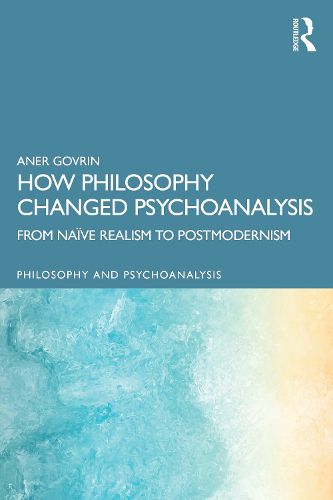Readings Newsletter
Become a Readings Member to make your shopping experience even easier.
Sign in or sign up for free!
You’re not far away from qualifying for FREE standard shipping within Australia
You’ve qualified for FREE standard shipping within Australia
The cart is loading…






Through this book, philosopher and psychoanalyst Aner Govrin demonstrates how psychoanalysis' engagement with philosophy was crucial in the evolution of new psychoanalytic theories in three areas: perception of truth, developmental theories, and study of psychoanalytic treatment.
Beginning with a Freudian perspective, through ego psychology to the intersubjective and the relational approach, Govrin shows that philosophy seeps into psychoanalytic theory itself, becoming a constitutive factor. When we discuss psychoanalysis, we cannot do it without reference to philosophy, since virtually every sentence it has generated harks back to and is embedded in philosophy. Moving onto the Post-psychoanalytic Schools Era in the second part, this seminal volume provides a model for understanding the evolution of psychoanalytic thought in the postmodern era, where "sensibilities" like the relational approach and infant research replaced the orthodox psychoanalytic schools. Govrin also explores whether psychoanalysis is a branch of philosophy, how psychoanalysis progresses, what a psychoanalytic innovation is, and why mainstream psychoanalysis rejects neuropsychoanalysis.
Exploring the intricate relationship between psychoanalysis and philosophy, this book will be of interest to clinicians, scholars, teachers, and students of contemporary psychoanalysis across a broad spectrum of theoretical orientations, as well as those in philosophy of science, epistemology, and neuropsychoanalysis.
$9.00 standard shipping within Australia
FREE standard shipping within Australia for orders over $100.00
Express & International shipping calculated at checkout
Through this book, philosopher and psychoanalyst Aner Govrin demonstrates how psychoanalysis' engagement with philosophy was crucial in the evolution of new psychoanalytic theories in three areas: perception of truth, developmental theories, and study of psychoanalytic treatment.
Beginning with a Freudian perspective, through ego psychology to the intersubjective and the relational approach, Govrin shows that philosophy seeps into psychoanalytic theory itself, becoming a constitutive factor. When we discuss psychoanalysis, we cannot do it without reference to philosophy, since virtually every sentence it has generated harks back to and is embedded in philosophy. Moving onto the Post-psychoanalytic Schools Era in the second part, this seminal volume provides a model for understanding the evolution of psychoanalytic thought in the postmodern era, where "sensibilities" like the relational approach and infant research replaced the orthodox psychoanalytic schools. Govrin also explores whether psychoanalysis is a branch of philosophy, how psychoanalysis progresses, what a psychoanalytic innovation is, and why mainstream psychoanalysis rejects neuropsychoanalysis.
Exploring the intricate relationship between psychoanalysis and philosophy, this book will be of interest to clinicians, scholars, teachers, and students of contemporary psychoanalysis across a broad spectrum of theoretical orientations, as well as those in philosophy of science, epistemology, and neuropsychoanalysis.